QUESTION 141
A company runs SQL Server Database Engine and SQL Server Reporting Services (SSRS) in native mode.
Reports are based on data that is cached in multiple shared datasets.
Source data is purged each day at midnight for regulatory compliance purposes.
The shared datasets may continue to cache data that should not be used in reports.
Shared report schedules are often paused during nightly server maintenance windows.
Reports must not return purged data.
You need to create a fully automated solution to ensure that reports do not deliver purged data.
What should you do? (More than one answer choice may achieve the goal. Select the BEST answer.)
A. Create a shared schedule. Configure the datasets to expire on the shared schedule.
B. Write a script that calls the flushcache method to clear individual items from the SSRS cache.
Create a SQL Server Agent job that runs rs.exe with the script as an input file, and schedule
the job to run every day after the purge process completes.
C. Create a SQL Server Agent job that uses a Transact-SQL (T-SQL) step to delete the data
from the dbo.ExecutionCache table in the ReportServerTempDB database.
Schedule the job to run every day after the purge process completes.
D. Republish the cached datasets by using SQL Server Data Tools.
Answer: B
QUESTION 142
You are designing a complex report that displays sales metrics for a customer hierarchy.
The customer hierarchy has six levels and contains approximately 1 million members.
You have the following requirements:
- Allow users to easily display and navigate data.
- Minimize report processing time.
- Simplify the report design and maintenance processes.
You need to design a report that meets the requirements.
How should you design the report? (More than one answer choice may achieve the goal. Select the BEST answer.)
A. Retrieve all customers and use drilldown groupings to show or hide hierarchy levels.
B. Add a report part for each hierarchy level.
C. Add a subreport for each hierarchy level.
D. Display only the children of the current hierarchy level and drill through to the selected
member.
Answer: D
QUESTION 143
You are using a new installation of SQL Server Reporting Services (SSRS) to create three sales reports that consume data from a stored procedure.
The stored procedure is defined in a Windows Azure SQL Database database.
All reports must pass USA to the Country parameter of the stored procedure.
Users cannot change the Country report parameter value.
You need to configure the report parameter properties.
How should you configure the report parameter properties? To answer, select the appropriate setting or settings in the answer area.
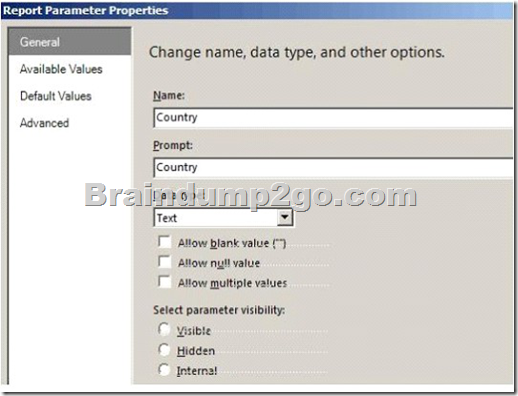
Answer:
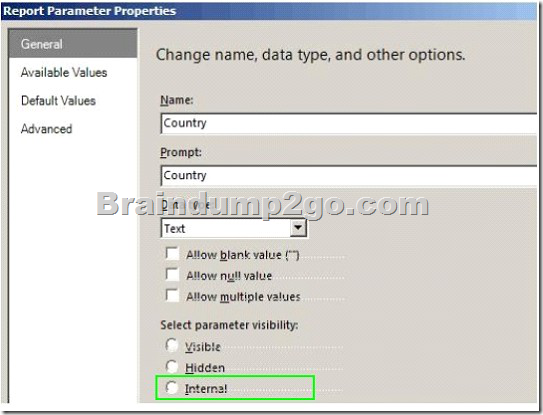
QUESTION 144
You deploy a PowerPivot workbook to a PowerPivot Gallery in a Microsoft SharePoint site. Workbook data comes from two different sources: Source A and Source B.
The workbook contains five tables with a total of 20 million rows from Source A, and three small lookup tables from Source B.
Data from Source A is updated throughout the day.
Data from Source B is updated at 3:00 P.M.
You have the following requirements:
- Refresh the PowerPivot workbook with updated lookup data as soon as possible.
- Minimize load on the source systems and the SharePoint environment during business hours.
- Minimize user involvement in the data refresh process.
You enable automatic data refresh for the workbook.
You need to configure a data refresh schedule for the workbook that meets the requirements.
What should you do? (More than one answer choice may achieve the goal. Select the BEST answer.)
A. Power View
B. Report Designer
C. Report Builder
D. PerformancePoint Services
Answer: A
QUESTION 145
You are designing aggregations for a SQL Server Analysis Services (SSAS) cube.
You need to ensure that every aggregation excludes the Category attribute.
Which option should you select? To answer, select the appropriate option in the answer area.
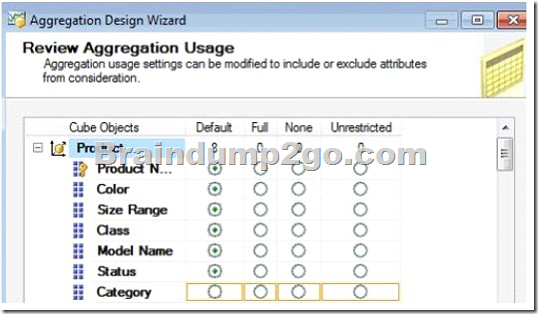
Answer:
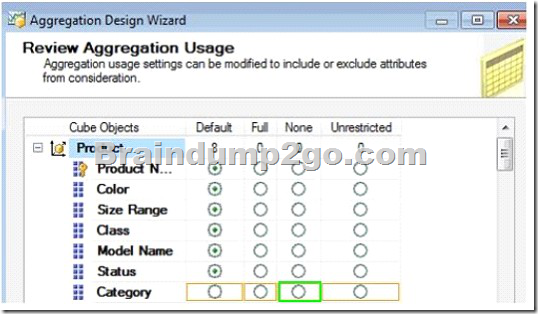
QUESTION 146
You are developing a SQL Server Analysis Services (SSAS) tabular project.
The DirectQuery Mode property of the data model has been set to On.
The current partition for the table is configured as the DirectQuery partition.
Data is loaded into a data mart throughout the day and must be available in the data model as soon as possible. The model must support querying by clients that issue both Data Analysis Expressions (DAX) queries and Multidimensional Expressions (MDX) queries.
Clients issuing DAX queries must receive real-time query results.
You need to select the appropriate Query Mode property for deployment.
Which query mode should you select? To answer, select the appropriate query mode from the drop-down list in the dialog box.
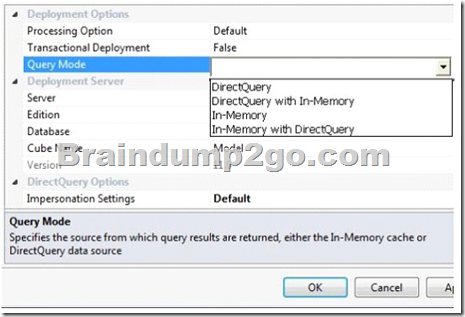
Answer:
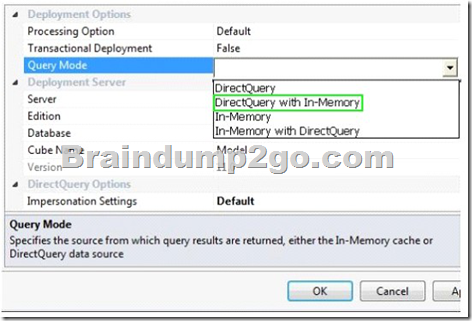
QUESTION 147
You are developing a SQL Server Reporting Services (SSRS) solution.
You plan to create reports based on a SQL Server Analysis Services (SSAS) tabular database configured in DirectQuery mode.
You need to configure a shared data source.
Which data source type should you use? To answer, select the appropriate type from the drop-down list in the answer area.
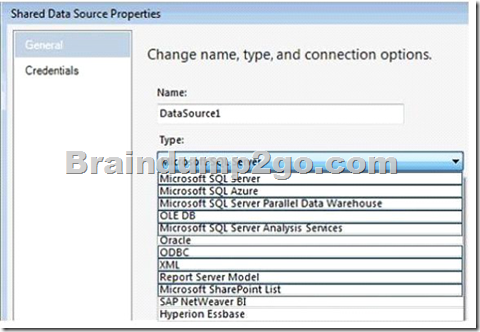
Answer:
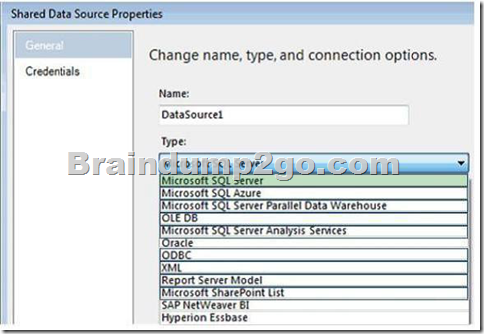
QUESTION 148
You are creating a SQL Server Integration Services (SSIS) package to populate a fact table from a source table.
The fact table and source table are located in a Windows Azure SQL Database database.
The source table has a price field and a tax field.
The OLE DB source uses the data access mode of Table.
You have the following requirements:
- The fact table must populate a column named TotalCost that computes the sum of the price and tax columns.
- Before the sum is calculated, any records that have a price of zero must be discarded.
You need to create the SSIS package in SQL Server Data Tools.
In what sequence should you order four of the listed components for the data flow task? (To answer, move the appropriate components from the list of components to the answer area and arrange them in the correct order.)
![wpsE7BA.tmp_thumb[2] wpsE7BA.tmp_thumb[2]](http://examgod.com/bdimages/bdda2ee12c60_D1F0/wpsE7BA.tmp_thumb2_thumb.png)
Answer:
![wpsD35.tmp_thumb[2] wpsD35.tmp_thumb[2]](http://examgod.com/bdimages/bdda2ee12c60_D1F0/wpsD35.tmp_thumb2_thumb.png)
QUESTION 149
You are developing a SQL Server Integration Services (SSIS) package to add a large amount of data to a fact table named factOrders.
The factOrders table is partitioned by week and has a clustered index.
You need to load three weeks' data into the factOrders table by using the most efficient method.
Which three actions should you perform in sequence? (To answer, move the appropriate actions from the list of actions to the answer area and arrange them in the correct order.

Answer:
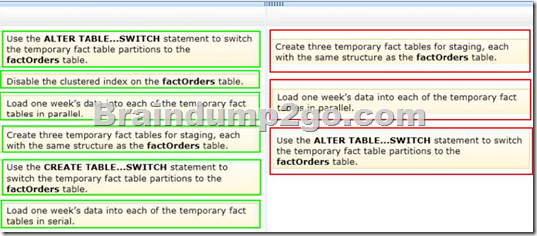
QUESTION 150
You are the database administrator of a SQL Server 2012 data warehouse implemented as a single database on a production server.
The database is constantly updated by using SQL Server Integration Services (SSIS) packages and SQL Server Analysis Services (SSAS) cube writeback operations.
The database uses the full recovery model.
A backup strategy has been implemented to minimize data loss in the event of hardware failure.
SQL Server Agent jobs have been configured to implement the following backup operations:
- A full database backup every day at 12:00 A.M.
- Differential database backups every day at 6:00 A.M., 12:00 P.M., and 6:00 P.M.
- Transaction log backups every hour on the hour.
At 2:38 P.M. a SSIS package corrupts the data in a fact table.
The corruption cannot be undone.
You are notified at 3:15 P.M.
You immediately take the database offline to prevent further data access and modification.
You need to restore the data warehouse and minimize downtime and data loss.
Which four actions should you perform in sequence? (To answer, move the appropriate actions from the list of actions to the answer area and arrange them in the correct order.
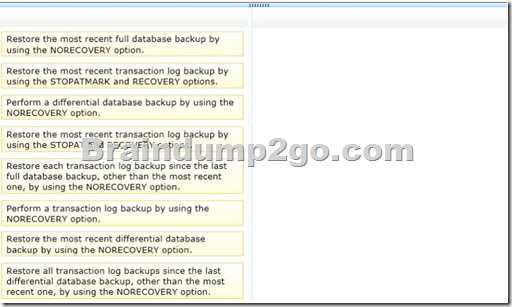
Answer:
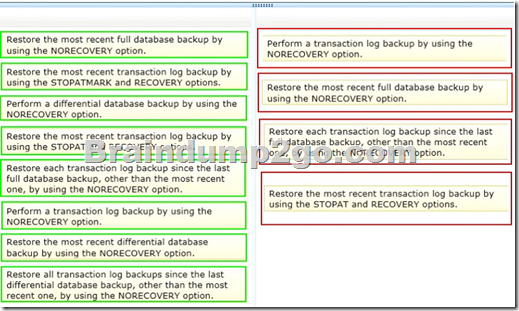









![wpsE7BA.tmp_thumb[2] wpsE7BA.tmp_thumb[2]](http://examgod.com/bdimages/bdda2ee12c60_D1F0/wpsE7BA.tmp_thumb2_thumb.png)
![wpsD35.tmp_thumb[2] wpsD35.tmp_thumb[2]](http://examgod.com/bdimages/bdda2ee12c60_D1F0/wpsD35.tmp_thumb2_thumb.png)




